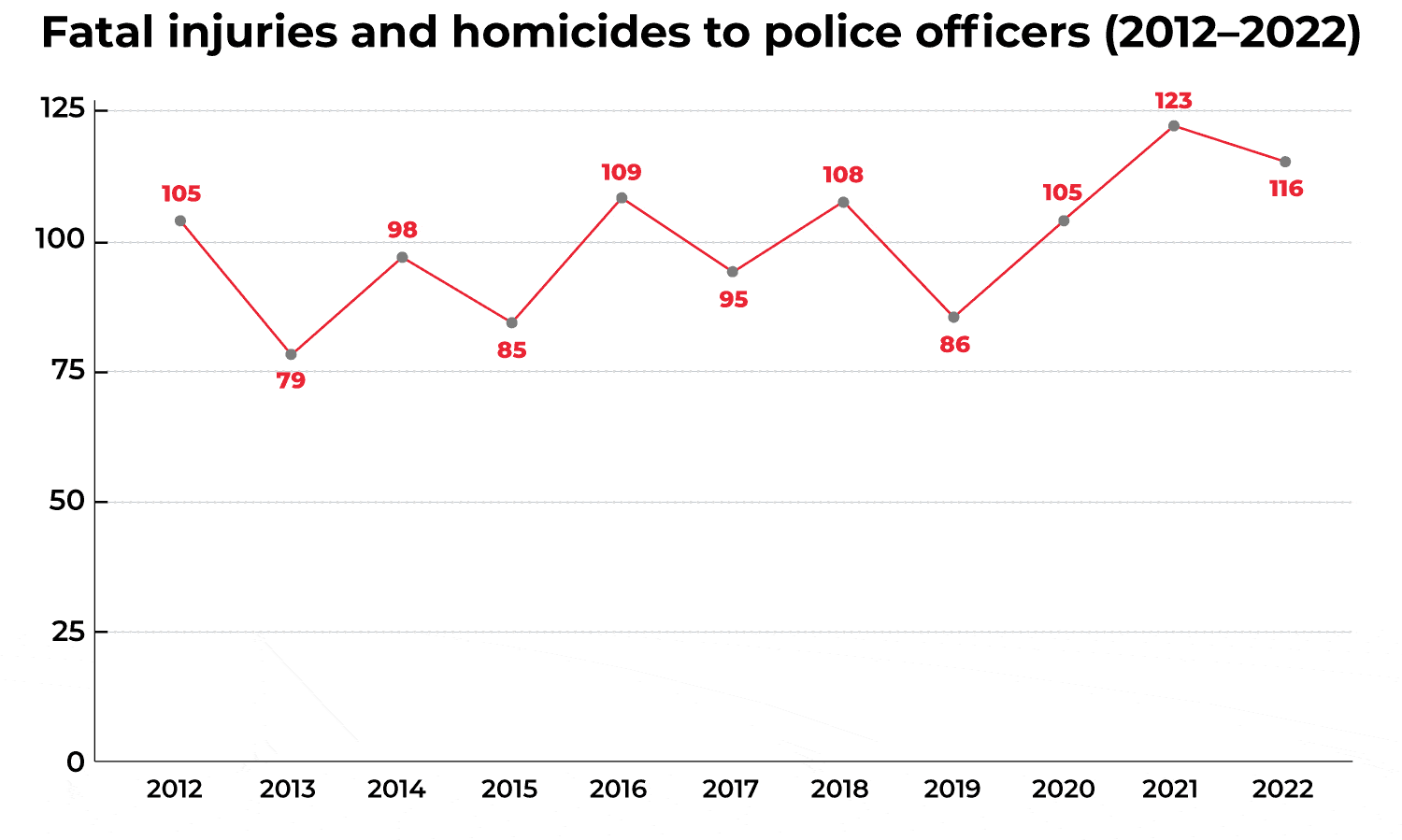Hurt in the line of duty?
Our experienced workers’ compensation lawyers stand up for police officers injured on duty.
“To protect and serve.”
This brave mission is the motto of police officers, cops and other law enforcement personnel who put their own lives on the line to keep the peace and maintain order in society. Sadly, despite the sacrifice and commitment of these courageous men and women in uniform, many members of the law enforcement community find it difficult to get compensated for a work-related accident, injury or illness.
If you were injured in the line of duty, know that you’re not alone.
At the Law Offices of Robert E. Wisniewski, our skilled Arizona workers’ compensation lawyers are ready to discuss your legal options after a line-of-duty injury or illness. Whether you were hurt breaking up a fight or hit by a reckless driver on the road, we can help you file a claim for workers’ compensation and make sure you get the full benefits you’re owed.
For 45 years, we have provided timely, dedicated representation to thousands of severely injured workers across Arizona—including police officers, peace officers, sheriff’s deputies, highway patrol officers, rangers, marshalls, detectives and other law enforcement personnel.
Workers’ compensation is all we do, and we do it well.
Without professional representation, many injured workers fail to receive the justice and compensation they deserve.
For 45 years, we’ve represented all types of injured workers and first responders—including police officers and their families.
If you were injured in the line of duty, or lost a loved one in a police officer fatality, talk to us about your workers’ compensation rights. There’s no charge to discuss your case with our experienced work injury attorneys and no upfront fees if you hire us to represent you. You only pay if we are successful in obtaining benefits for you.
It costs no more to have the best!
Integrity, Care and Compassion
“You have shown integrity, care and compassion concerning my case – as well as my self – personally, which most would not have bothered themselves with. This personal touch counts and I will definitely toot your horn for you whenever there is a need or opportunity to do so. Again, I thank you and I greatly appreciate what you have all done for me. You will all be in my heart and mind. Sincerely and with great appreciation.” – K.S.
Police officer injury statistics
With police officer injuries and fatalities up in recent years, workers in law enforcement continue to be more likely to experience a work-related injury or death than workers in almost any other occupation.
In fact, police officers are 3 times more likely to sustain a non-fatal injury at work than all other U.S. workers. An officer is assaulted every 10 minutes in the U.S., on average.
The U.S. Bureau of Labor Statistics reports that between 2021 and 2022, there were 239 fatal injuries and 6,680 non-fatal injuries to police officers due to assaults that required at least one day off work or job restrictions. The annual incidence rate for police officer injuries was 58 per 10,000 full-time workers, with a median recovery time of 2 weeks.
Between 2003 and 2014, the U.S. Bureau of Labor Statistics reported 115 fatal police and sheriff’s patrol officers work injuries each year. From 2009 to 2014, there were an additional 30,990 nonfatal injuries each year involving days away from work. Men accounted for a majority of fatal and nonfatal injuries while on duty.
Source: U.S. Bureau of Labor Statistics
Most common injuries for police officers
A few of the most common injuries in the law enforcement profession include:
- Amputation
- Traumatic brain injuries
- Gunshot wounds
- Overexertion (sprains, strains and tears)
- Fractured and broken bones
- Hip injuries
- Musculoskeletal injuries
- Cuts, lacerations and punctures
- Repetitive motion injuries
- Death
The most common causes of police injuries and fatalities include being assaulted by other people (homicide) or animals, slip and falls, car crashes, impact with objects or equipment, exposure to toxic or dangerous substances, fires and explosions.
Whatever the cause, a majority of police officer injuries are covered by workers’ compensation in Arizona.
Police officer injured on duty claim
The greater risk of injury that police officers face on a daily basis has an impact on not only the department and community at large, but also on the individual officer and their families, which are faced with the financial and emotional burdens caused by missing days at work, medical bills and injury rehabilitation.
Fortunately, Arizona workers’ compensation law provides benefits to police officers, cops and other law enforcement agents in the event of an injury or fatality in the line of duty.
Workers’ compensation is a “no fault” system in Arizona, which means injured officers receive benefits no matter who caused the accident (even if it was the fault of the officer). These benefits provide compensation for:
- Medical expenses (emergency room visits, hospital bills, physical therapy, travel expenses to doctor appointments, prescriptions, etc.)
- Wage loss and disability benefits
- Funeral expenses (in the event of a work-related fatality)
It’s the injured officer’s responsibility to file a claim within 1 year of the date of injury. If you’ve been injured in the line of duty, you should notify your captain or a supervisor as soon as possible.
Next, contact an experienced workers’ compensation attorney near you. Many claims are initially denied, and a knowledgeable lawyer will be able to tell you how to appeal the denial, how much benefits you deserve and what to do next.
Third-party police injury lawsuits
Although workers’ compensation prevents injured police officers from suing their department or agency for a line-of-duty injury or illness, there are some cases where a third-party can be held responsible for an officer’s damages. For example, if a highway patrolman is seriously hurt in a car accident caused by a distracted driver, they may be able to file a third-party personal injury claim against the at-fault driver in addition to filing a workers’ compensation claim.
These cases can help an injured officer receive compensation for damages not covered under workers’ compensation, such as pain and suffering. However, establishing liability and negligence in third-party cases is often difficult. In these scenarios, it’s best to consult an experienced attorney who can represent you and stand up to the insurance companies with their deep pockets and teams of lawyers at their disposal.
Case Results
Bob Wisniewski gets the Arizona Court of Appeals to reverse the trial court’s decision. The trial court at the Industrial Commission of Arizona originally denied benefits to a police officer for post-traumatic stress disorder (PTSD). They held that the officer failed to file his claim within 1 year on the basis he “knew or should have known” he had PTSD. Wisniewski argued on appeal that the standard requires a medical diagnosis of a condition, not a layman’s perception. The court agreed and reversed the decision of the Industrial Commission of Arizona.
This court decision is significant, not only for this officer but for all first responders. Post-traumatic stress disorder often takes a long time to manifest its symptoms, and this now helps first responders who timely file after a medical diagnosis.
Police workers’ compensation FAQ
Can police officers get compensation for off duty injuries?
In 2008, the Arizona Court of Appeals ruled that off duty officer injuries should also be covered by workers’ compensation in certain circumstances. However, these claims are more complex and nuanced, and insurers often initially deny off duty workers’ compensation claims.
Take the case of Kelly J. Lane v. The Industrial Commission of Arizona:
Kelly J. Lane, a police officer for the Tucson Police Department, was riding his mountain bike with two friends while off duty at night in rural Pinal County, Arizona. After the ride, they were standing near their vehicles when they heard gunshots. While helping his friend get behind the safety of a vehicle, Lane was shot in the back. He received emergency surgery immediately, had several more surgeries as part of his recovery, and spent 30 days in an intensive care unit.
Officer Lane said that he made this action to protect his friend based on his police training, and his captain concluded that he had been “acting as a law enforcement officer at the time of the shooting.” However, the claim was contested by the insurance company and the administrative law judge ruled that Lane’s claim was “noncompensable,” saying he hadn’t been acting as a peace officer at the time he was injured. Therefore, his injury didn’t “aris[e] out of and in the course of his employment” as required by A.R.S. § 23-1021(A) to be covered by workers’ compensation.
Officer Lane appealed, making the convincing argument that his injury did, in fact, arise out of his employment because his job training as a police officer increased the risk that he would be hurt while responding to the shooting. The appeals court agreed and ruled that his injuries were indeed compensable, reversing the administrative law judge’s earlier ruling.
In addition, police officers and other first responders are eligible for workers’ compensation in Arizona while traveling to or from work. According to Arizona law (23-1021.01):
“A peace officer or fire fighter as defined in section 1-215 who is injured or killed while traveling directly to or from work as a peace officer shall be considered in the course and scope of employment solely for the purposes of eligibility for workers’ compensation benefits, provided that the peace officer or fire fighter is not engaged in criminal activity.”
Can police officers be compensated for work-related PTSD?
Individuals employed as police officers, firefighters, EMTs and other first responders can experience post traumatic stress disorder (PTSD) caused by witnessing traumatic events.
In Arizona, a bill was passed that expanded workers’ compensation benefits for police officers diagnosed with PTSD. This change came after an officer who lost his job for a misdemeanor DUI committed suicide.
He had developed a drinking problem to help cope with his PTSD caused by a fatal on-duty shooting he was involved in years before. However, proving that PTSD is work-related can be a difficult task for many Arizona police officers since insurance companies remain skeptical of mental injury claims.
Take the case of Pitts v. The Industrial Commission of Arizona:
In May 2013, Benjamin Pitts, an officer for the City of Chandler, Arizona, was on duty in his patrol car with his fiancée, who was participating in a ride along. He was dispatched to a hospital where a man had been seen with a gun. When they arrived, the man shot at Pitts’ squad car, which shattered the windshield. Pitts returned fire and shot the man in the shoulder, ending the altercation.
Neither Officer Pitts nor his fiancée were physically injured. However, over 2 years later, he was diagnosed by his doctor with probable PTSD. Then, in January 2016, Pitts was diagnosed with dissociative complex PTSD related to the shooting incident and taken off patrol duty. He filed for workers’ compensation in October 2016, but the insurer initially denied his claim, saying it was past the statute of limitations. The administrative law judge agreed with the insurance company.
Officer Pitts appealed to the Court of Appeals of Arizona, Division One in Phoenix, which unanimously agreed that there was insufficient evidence to support the AJL’s ruling to deny benefits for PTSD. The appellate judges said that unlike physical injuries where a diagnosis is immediate and evident, mental health injuries are more challenging to detect. Since Pitts didn’t know of his PTSD condition until 2016, his injury was compensable and not time-barred.
What if a police officer is killed in the line of duty?
In the case of a fatal police incident, the compensation owed (known as “death benefits”) is paid to the deceased officer’s surviving dependents. The most common examples of eligible dependents include the officer’s spouse and children/stepchildren, but their parents and even siblings may be eligible if there are no primary dependants.
In Arizona, line-of-duty death benefits generally come from 4 possible sources:
- National Law Enforcement Officers Memorial Fund
- Public Safety Retirement system
- Workers’ compensation
- Private sector sources
Each of these sources may have a different definition of “line-of-duty death” and eligibility requirements to receive the benefit. Each case is decided on its own facts.
If your loved one dies due to a line-of-duty accident or act of violence, workers’ compensation death benefits in Arizona will be made available to you in order to help reduce the financial stress placed on you and your family during this difficult time.
By filing a workers’ compensation claim on your deceased loved one’s behalf, you can receive compensation for:
- Medical care that your loved one required after the work-related injury that resulted in their death
- Wage loss earnings and disability benefits
- Funeral expenses (up to $5,000)
Help for law enforcement officers & first responders injured on the job

Can you receive compensation for job-related mental stress?

Our experienced workers’ compensation lawyers stand up for police officers injured on duty.

How ambulance drivers, EMTs and paramedics in Arizona can obtain their workers’ compensation benefits

How Arizona workers’ compensation law applies to firefighters injured or killed in the line of duty

Working with PTSD may not be easy, but it can be manageable.

A critical appeals case was decided in favor of police, firefighters and first responders.

Workers’ compensation certified specialist. PTSD lawyer for first responders and police officers.
Questions and answers about compensation for a job-related accident, injury or illness in Arizona

Arizona Workers’ Compensation Guide
FREE E-BOOKWhat do you do if you’re injured on-the-job? Our free guide contains knowledge to help the injured worker understand the workers’ compensation application process.

Mr. Wisniewski has been recognized as the premier workers’ compensation lawyer in Arizona. He is the only claimants’ attorney recognized as a Fellow of The College of Workers’ Compensation.
"It costs no more to hire the best."
Our Arizona work injury lawyers will protect your right to compensation and serve your family
If you or a loved one were seriously hurt or killed in the line of duty, it’s important you act swiftly to secure your compensation. At the Law Offices of Robert E. Wisniewski, we regularly represent injured police officers and their families to make sure they get the full workers’ compensation benefits they deserve.
It doesn’t take much to put your entire career and your family’s finances in jeopardy. We can help you file a work injury claim with the Industry Commission of Arizona and fight to appeal a denied claim if necessary. We’re prepared to use our experience, expertise, resources and passion to make sure you get the compensation you’re owed.
Why hire our Arizona workers’ comp lawyers?
- We understand the special needs of an injured worker
- Trained and helpful staff
- Personal attention to clients
- Calls promptly returned
- Clients kept up-to-date on case
- State-wide service
- Aggressive & experienced representation
- Hablamos español
While our main law office is in downtown Phoenix, we handle workers’ compensation claims throughout Arizona – including Yuma, Kingman, Payson and Flagstaff.






